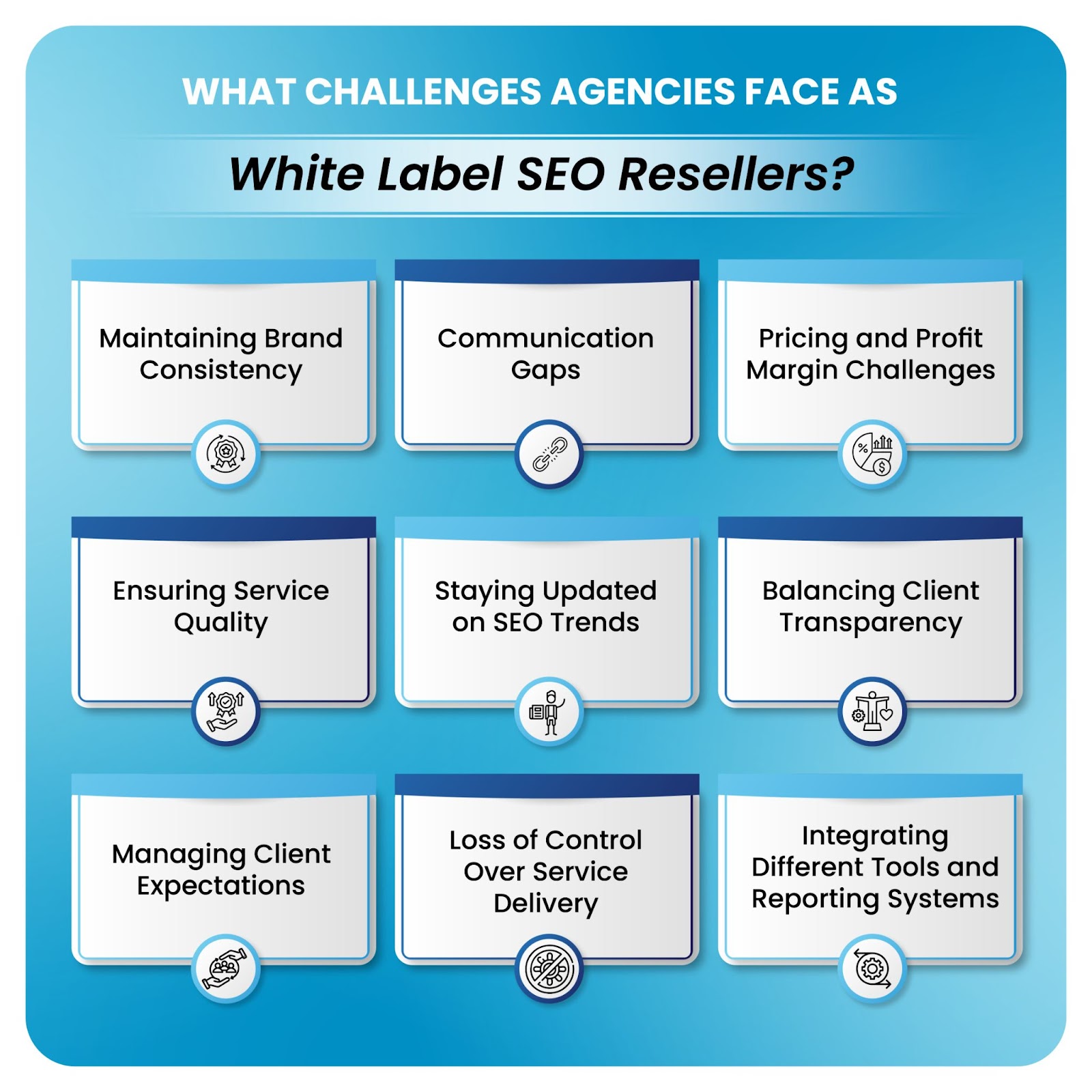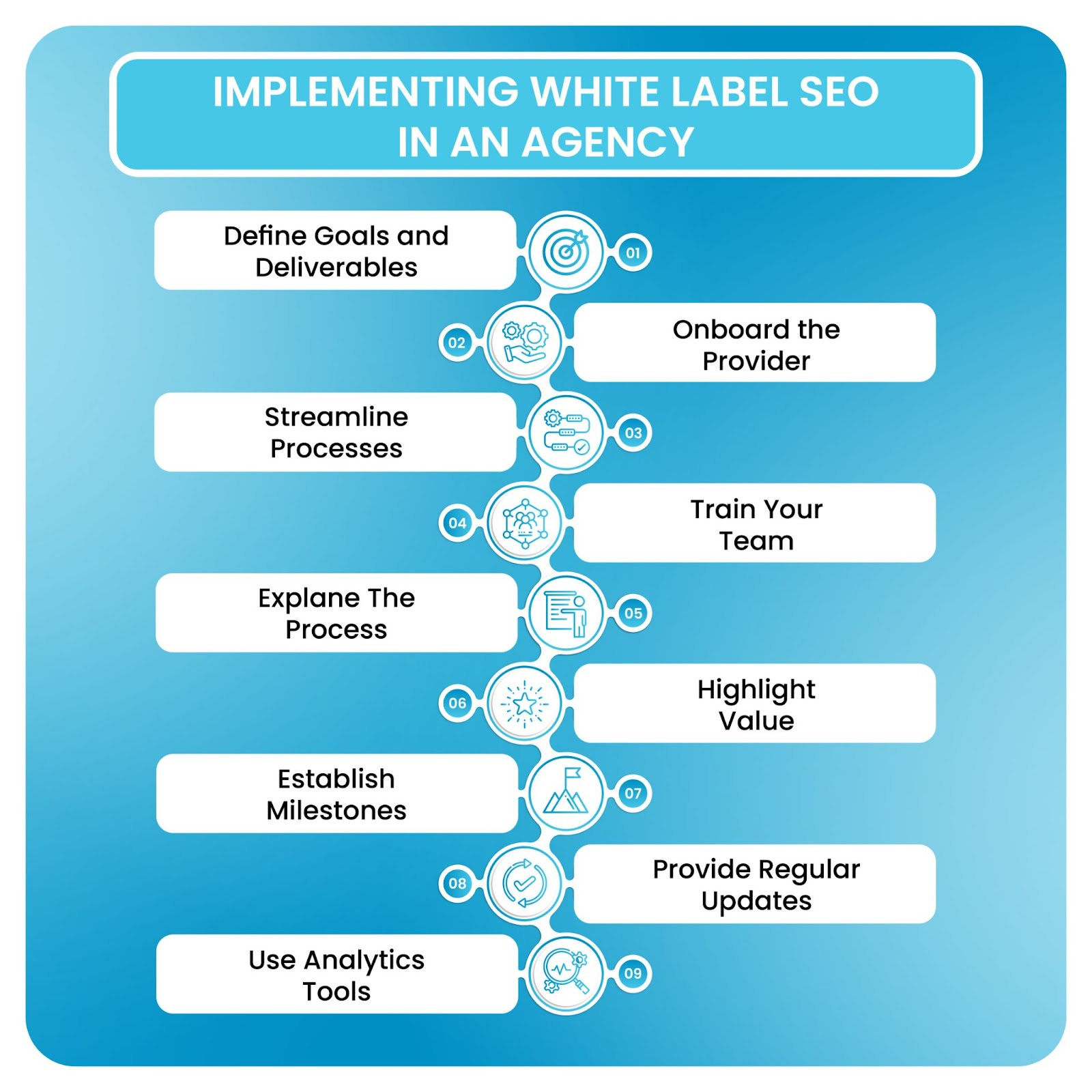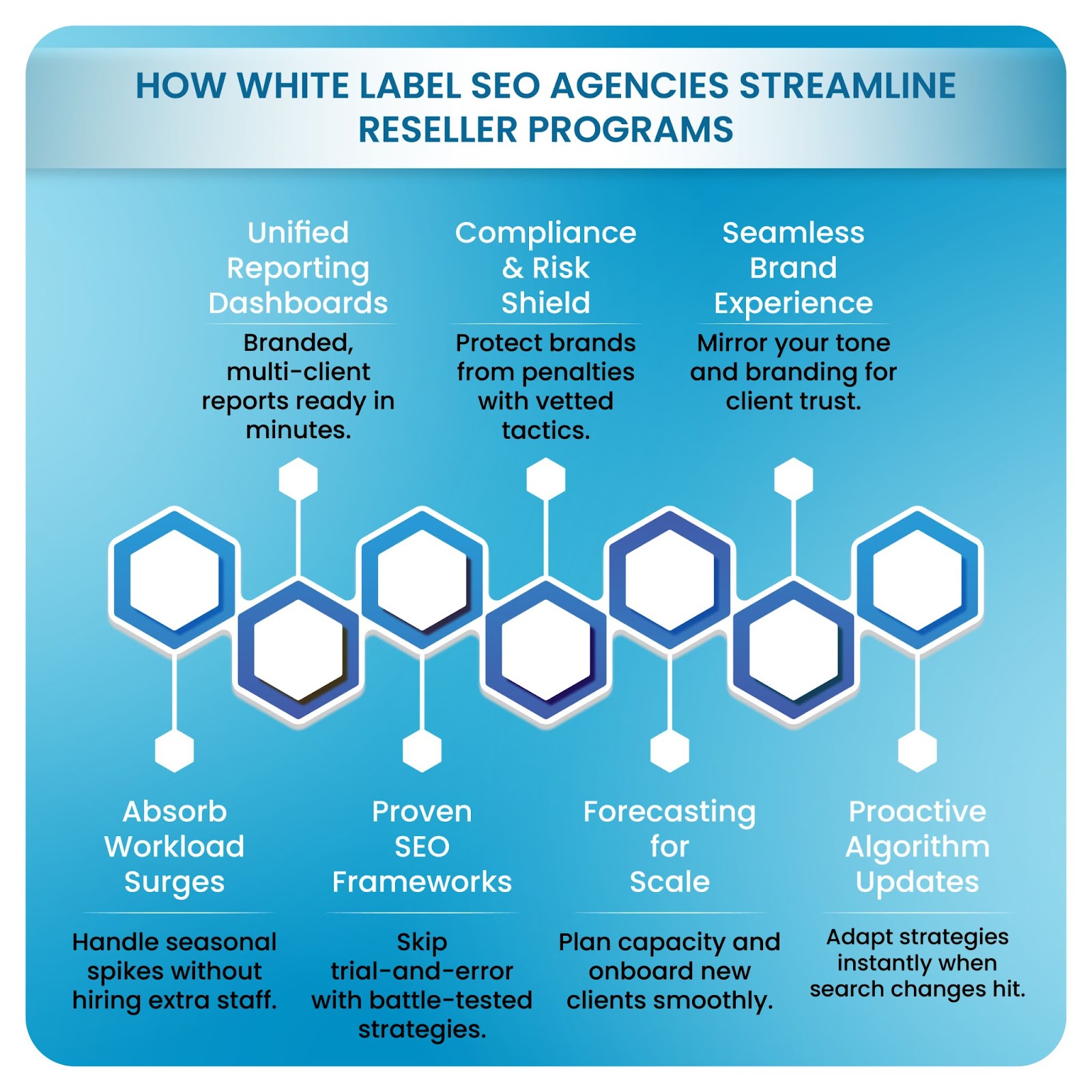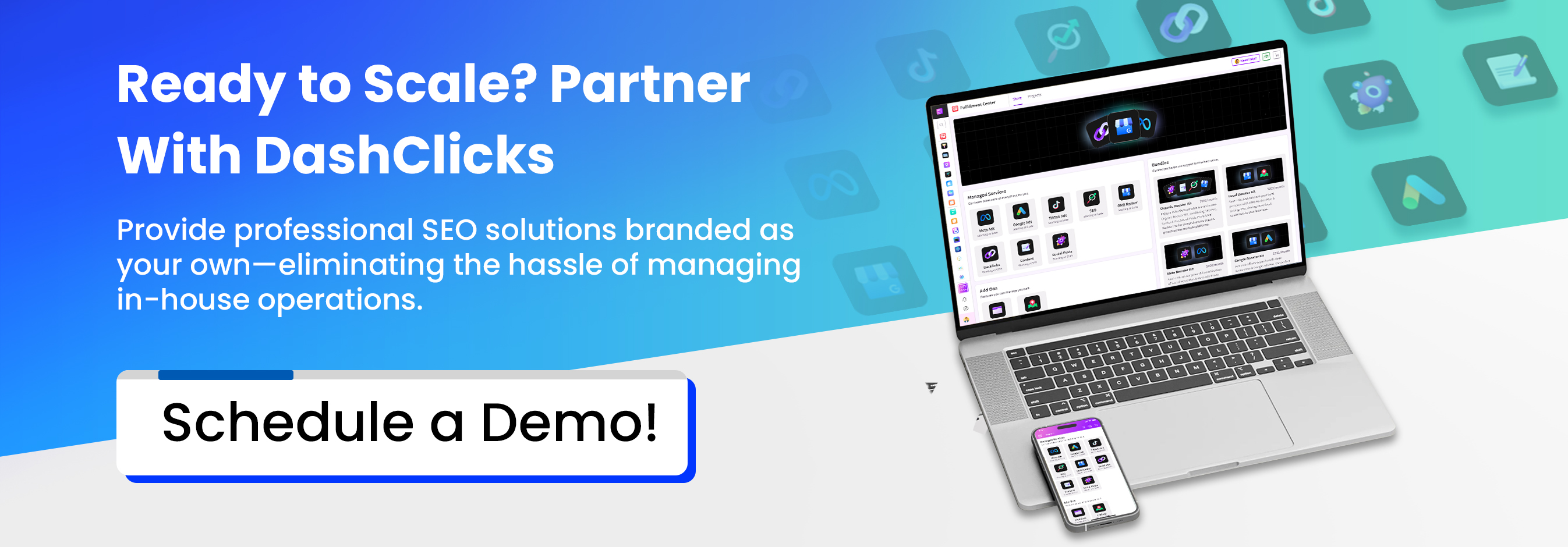The digital marketing world is growing faster than ever, and SEO is leading the charge. With over 93% of all online experiences beginning with a search engine, it’s no surprise that businesses across all sectors are ramping up their SEO efforts to drive organic visibility, build trust, and secure long-term growth.
The global SEO services market is projected to rise from $68.1 billion in 2023 to over $103.24 billion by 2028, according to recent industry research. This surge highlights a massive opportunity for digital agencies to offer SEO—not necessarily by building an in-house team, but by reselling white label SEO services under their brand.
If your agency lacks the bandwidth, specialized staff, or technical expertise to provide end-to-end SEO internally, becoming a white label SEO reseller could be the fastest and most cost-efficient path to scale.
Why Agencies Are Abandoning the “Do It All” Mindset?
Trying to master every digital service internally isn’t just impractical—it’s increasingly unsustainable. Modern agencies are under pressure to deliver faster, provide more value, and maintain quality, all while staying profitable. Hiring a full SEO team, managing training, and keeping up with Google’s 500+ algorithm updates yearly simply isn’t feasible for most small or mid-sized agencies.
A recent HubSpot report revealed that nearly 50% of marketing agencies outsource at least part of their SEO, with white label partnerships being one of the most common models. Why? Because they allow agencies to scale rapidly without operational complexity or hiring costs.
Rising Demand for SEO Services Among Businesses
Businesses are investing more into SEO than ever before—and they’re looking for providers who can deliver measurable results. Consider these key stats:
- 70% of marketers say SEO is more effective than PPC for generating sales over time (Databox).
- 75% of users never scroll past the first page of Google results (HubSpot).
- Companies that blog consistently (a key component of SEO) get 67% more leads than those that don’t.
As these trends continue, marketing agencies must meet this demand—or risk losing clients to competitors who do.
What “White Label” Really Means for Your Brand Identity?
Many agency owners hesitate at the idea of outsourcing, fearing it could dilute their brand. However, white label SEO is designed to do the opposite—strengthen your brand presence while expanding your capabilities.
Here’s how:
- Fulfilment Behind the Curtain: White label SEO providers handle all back-end work (strategy, link building, content, audits) while your brand remains the face of the service.
- Client Trust Preservation: You remain the primary point of contact. Clients only see your branding on reports, dashboards, and communications.
- Psychological Advantage: When clients see a unified brand (yours), it builds confidence. There’s no need to reveal that fulfilment is outsourced—because with white label services, it feels in-house.
What Does It Mean to Be a White Label SEO Reseller?
A white label SEO reseller is an agency that sells SEO services under its brand while outsourcing the actual execution to a third-party provider. The client only interacts with your agency, never knowing that another team is handling the fulfillment work.
This model provides the best of both worlds: you can offer high-quality SEO services without needing in-house specialists, developers, or content writers.
What “White Label” Means for Client Perception and Brand Control?
Client trust is one of your most valuable assets. White label SEO helps protect and enhance that trust by:
- Delivering expert-level SEO without delivery delays or inconsistencies.
- Ensuring all reports, dashboards, and deliverables are fully branded.
- Giving clients a seamless experience, with no sense of third-party involvement.
According to BrightLocal, 84% of customers value transparency and brand consistency when working with marketing service providers. White label SEO lets you deliver both—at scale.
Spotting the “Reseller-Ready” Moment in Your Agency’s Journey
Knowing when to evolve from a full-service provider into a white label SEO reseller can make all the difference in your agency’s growth trajectory. If you're on the fence, look out for these signs—it might be time to stop juggling everything and start scaling smart.
- Clients Keep Requesting SEO… But You Can’t Fulfill It Internally: If you're constantly turning down SEO projects or referring them to other providers, you're leaving money—and long-term client relationships—on the table. Reselling lets you say “yes” to more without overloading your team. Whether it’s keyword strategy, content creation, or local SEO, repeated client demand signals a clear opportunity.
- Your Team Lacks the Technical SEO Expertise: You may offer social media, email marketing, or web design—but SEO is a different beast. It requires ongoing training, advanced tools, and deep knowledge of algorithms, audits, link-building, and more. According to Moz, 64% of marketers consider link-building the most challenging aspect of SEO. If your team isn’t equipped to handle this complexity, outsourcing fulfilment is the smart move.
- You Want to Increase MRR Without Increasing Operational Costs: Recurring revenue is the backbone of any scalable agency model. White label SEO allows you to add high-margin, recurring services without the cost of hiring new staff or building processes from scratch. Agencies with recurring revenue models grow 2.3x faster than those dependent on one-off projects (Forrester). You get the benefit of monthly SEO retainers—without the burden of fulfilment.
- Your Agency’s Growth Has Plateaued Due to Limited Offering: If you're great at design, ads, or branding—but clients start asking for comprehensive digital packages—limited services can hold your agency back. Expanding into SEO unlocks new markets, enhances client retention, and positions you as a one-stop solution. Offering bundled services can increase client lifetime value by up to 50% (HubSpot).

Steps to Becoming a White Label SEO Reseller
Ready to scale your agency without the headaches of in-house fulfilment? Follow this structured roadmap to build a thriving white label SEO offering under your brand.
Step 1: Assess Your Current Service Capabilities
Before jumping in, take a clear-eyed look at your agency’s existing capabilities:
- Do you lack in-house technical SEO skills such as site audits, schema markup, or crawl optimisation?
- Are your clients requesting high-quality blog content or backlinks you can’t consistently deliver?
- Is your team stretched too thin to manage SEO projects while handling your core services?
By identifying your internal gaps—whether it’s knowledge, bandwidth, or tools—you’ll be better equipped to find the right white label SEO partner who fills those exact needs.
Pro Tip: Survey your clients to discover untapped SEO demand you might be missing.
Step 2: Choose the Right SEO Reseller Partner
Your reseller will be an extension of your team—so it’s critical to choose wisely. Look for:
- Proven Track Record: Ask for verifiable results—case studies, testimonials, and third-party reviews. Check for niche expertise (e.g., local SEO, eCommerce, etc.).
- Transparency: Ensure clear pricing models, well-defined deliverables, and transparent reporting mechanisms are in place. Ambiguity is a red flag.
- Flexible Packages: A one-size-fits-all solution won’t cut it. Look for customisation based on business size, industry, and goals.
- Responsive Support: Fast, consistent communication is essential—ideally through a dedicated account manager or partner success team.
Further Reading: How to Choose a White Label SEO Partner That Delivers Real Results
Step 3: Set Realistic Expectations With Clients
SEO is not an overnight fix—it’s a long-term investment. One of the biggest mistakes agencies make is overpromising results.
- Be upfront. Results typically begin to appear between 3 to 6 months.
- Educate clients on KPIs like keyword rankings, traffic growth, and backlink acquisition.
- Provide regular performance reports and explain the “why” behind each metric.
Pro Tip: Use branded reports and dashboards to reinforce credibility and transparency.
Step 4: Integrate White Label SEO Into Your Agency Workflow
A seamless process is key to delivering consistent value.
- Build SEO tasks into your existing onboarding and project timelines.
- Assign internal team members to liaise with the white label SEO provider.
- Use shared tools like DashClicks’ Conversations Software to centralise communication.

The smoother your internal processes, the better the client experience.
Step 5: Leverage Automation and Technology
Manual processes don’t scale—but automation does. Leading white label providers like DashClicks offer:
- Live Dashboards: Give clients access to real-time SEO metrics and campaign progress.
- Automated Reports: Save hours on monthly performance reporting.
- CRM & Task Integrations: Keep sales, support, and fulfilment in sync.
Automation not only saves time, but it also reduces errors and enhances your professionalism.
Fact: Agencies using automation grow 1.6x faster than those relying on manual methods.
Step 6: Brand Everything as Your Own
Client experience is everything—and branding plays a major role in shaping it.
- Use white label dashboards, reports, emails, and client portals.
- Ensure your logo, colours, and voice are consistently applied across all touchpoints.
- Reinforce that your agency is the driving force behind the results, even if fulfilment is outsourced.
This level of polish positions you as a premium provider and builds long-term loyalty.
Step 7: Focus on Sales and Client Growth
With SEO fulfilment handled, you can shift your energy toward revenue-driving activities:
- Upsell existing clients on SEO if they’re already buying PPC, web design, or social media services.
- Increase outreach and sales activity without worrying about delivery delays.
- Cross-sell SEO with related services like content marketing or GMB optimisation.
Stat: Agencies that outsource SEO report an average revenue increase of 32% within the first year.
Avoiding the Top 5 “Silent Killers” of SEO Reseller Programs
While white label SEO services can be a powerful way to scale your agency, success hinges on strategy, communication, and oversight. These five pitfalls silently eat away at performance, client trust, and long-term revenue—often without immediate warning signs.
1. Ignoring Quality Control and Relying Blindly on Vendors
One of the biggest risks agencies make is assuming their reseller partner will always deliver consistent, high-quality work—without ongoing oversight.
Why it’s dangerous:
- SEO success depends on quality content, natural backlinking, ethical practices, and adherence to Google's guidelines.
- A vendor cutting corners (e.g., spinning content, low-quality backlinks) may produce short-term results—but can damage your client’s rankings or trigger penalties long-term.
- Since your agency’s name is on every report, you carry the blame if something goes wrong.
What to do instead:
- Regularly audit the deliverables your white label team produces.
- Use live dashboards and transparent task tracking (like those offered by DashClicks) to stay in control.
- Establish a feedback loop and review reports, content samples, and links before they reach clients.
2. Misaligned KPIs: What the Provider Optimizes vs. What Clients Expect
Many agencies lose clients because they don’t align business goals with what the SEO provider is optimizing for. For instance, your client wants leads, but your provider is focused on keyword rankings or blog traffic that doesn’t convert.
Why it matters:
- Clients care about outcomes: more calls, more form fills, more revenue—not just technical metrics.
- If you don’t define success clearly, even a technically “good” campaign can appear like a failure.
What to do instead:
- Set mutually agreed KPIs upfront, such as organic leads, calls, conversions, or rankings for purchase-intent keywords.
- Choose a provider that supports goal-oriented strategies—not just cookie-cutter SEO templates.
- Customize each campaign’s focus based on the client’s niche, goals, and conversion funnel.
3. Overpromising Rankings in Unrealistic Timeframes
In an attempt to win clients quickly, some agencies make the fatal mistake of promising top rankings within a month or two—especially for competitive keywords.
Why it’s harmful:
- SEO is a long-term strategy. Quick wins are possible, but rarely sustainable.
- Unrealistic promises lead to client disappointment, high churn, and negative reviews—even if the campaign is performing well by industry standards.
What to do instead:
- Educate your clients from day one: SEO takes 3–6 months to build traction, and even longer for competitive markets.
- Emphasize incremental gains—like improved site health, higher domain authority, and better keyword positioning.
- Use clear timelines, milestone reports, and visual progress tracking to set the right expectations.
4. Not Adapting Packages to Evolving Algorithm Changes
Google updates its search algorithm thousands of times per year—and major core updates can instantly tank rankings that were stable for months.
What happens if you don’t adapt:
- Outdated SEO tactics (like over-optimized anchor text, keyword stuffing, or spammy links) stop working—or worse, trigger penalties.
- Packages that worked last year may be completely ineffective today.
What to do instead:
- Work with a provider who actively monitors Google algorithm updates and adjusts strategy accordingly.
- Regularly update your SEO packages to reflect modern best practices—like helpful content, E-E-A-T (Experience, Expertise, Authoritativeness, and Trustworthiness), and mobile-first indexing.
- Don’t “set and forget.” SEO is a living, breathing process.
5. Treating Fulfillment as “Set and Forget”
White label doesn’t mean hands-off. Some agencies assume once they outsource SEO, their job is done. That’s a mistake.
Why it fails:
- Client communication, reporting, and campaign direction still fall on your shoulders.
- Without regular check-ins, performance reviews, or course corrections, even great providers can fall out of sync with client needs.
What to do instead:
- Schedule monthly strategy reviews with your white label SEO partner.
- Maintain regular client reporting calls, using white-labeled dashboards to demonstrate transparency.
- Stay proactive. Ask for feedback from clients and escalate concerns early.

The Future of SEO Reselling: Where the Market Is Headed
The SEO landscape is evolving at a breakneck pace—driven by AI advancements, changing search behaviour, and Google’s continual focus on quality and intent. For agencies reselling SEO, staying competitive means not just keeping up, but adapting their offerings to meet what’s next.
Here’s what the future of SEO reselling looks like, and how your agency can prepare:
1. Hyper-Local SEO and Map Pack Dominance
Local searches like “near me” or “open now” have surged by over 400% in recent years, and nearly 46% of all Google searches now have local intent. That means the Google Map Pack (local 3-pack) is more valuable than ever.
What it means for resellers:
- Expect increasing demand from SMBs, medical practices, legal firms, and home services to dominate their local search results.
- SEO packages will need to include local citation building, NAP consistency, Google Business Profile optimization, and localized content tailored for specific zip codes or neighborhoods.
- Agencies must prioritise reputation management and review generation, both of which influence local rankings.
Opportunity: White label providers that offer hyper-local SEO packages—including dynamic location page creation and Google Maps integration—will lead the charge.
2. E-E-A-T and Brand Authority as Ranking Factors
With Google’s emphasis on Experience, Expertise, Authoritativeness, and Trustworthiness (E-E-A-T), SEO is moving far beyond technical fixes and backlinks.
Why this matters:
- Brands that build trust, showcase real authors, and demonstrate credible expertise will have an edge in organic rankings.
- Google’s algorithm is rewarding authentic content—especially in Your Money or Your Life (YMYL) niches like finance, health, and law.
Reseller strategy shift:
- Providers will need to invest in expert-written content, author bios, first-hand experience case studies, and stronger digital PR strategies.
- Agencies must position themselves as thought leadership builders, not just keyword rankers.
Pro Tip: Choose white label partners who use real content writers with subject expertise and allow branded authorship in deliverables.
3. Voice Search and Zero-Click Results
As of 2025, 20–21% of global internet users use voice search regularly, and zero-click searches already account for more than 65% of Google results—where users find answers directly on the search results page (SERP) without clicking.
What changes:
- SEO resellers must optimise for conversational queries, featured snippets, FAQs, and structured data.
Content must be formatted to quickly answer questions—preferably in 15–30 word summaries. - Schema markup, question-based content, and mobile-first designs will become non-negotiable.
Voice search-specific SEO includes:
- Targeting long-tail keywords that mimic natural speech.
- Optimising for “who, what, where, when” queries.
- Ensuring fast page load speeds and mobile responsiveness.
Key Takeaway: The most successful white label SEO programs will adapt to the growing need for immediate answers, frictionless access, and natural language optimisation.
4. Subscription-Based SEO Reselling
SEO has traditionally been sold as a monthly retainer, but the future is shifting toward tiered subscription models with clearer deliverables, bundled features, and automation baked in.
Why subscriptions win:
- They offer predictable revenue for agencies.
- Clients appreciate transparency and simplicity in what they’re buying.
- Automation platforms like DashClicks allow plug-and-play service bundles that reduce fulfillment time and costs.
What this model looks like:
- Bronze, Silver, Gold SEO plans—each with defined services (e.g., X blogs, X backlinks, X optimisations per month).
- Easy upsell/cross-sell pathways for PPC, social media, and content marketing.
- Clients receive automated, white-labeled reports and dashboards.
Future-focused agencies will adopt these models to scale faster, reduce churn, and enhance client satisfaction—especially when paired with smart onboarding and real-time analytics.
Why DashClicks Is the Go-To White Label SEO Partner?
If you’re stepping into the world of white label SEO, choosing the right partner is crucial. DashClicks is built specifically for digital marketing agencies looking to scale without compromising quality, transparency, or client experience.
Here’s why DashClicks’ white label SEO services stands out from the rest:
1. Expert Team: Gain access to a dedicated team of seasoned SEO professionals with proven experience in technical SEO, on-page optimisation, link building, and content strategy. DashClicks’ experts stay ahead of Google’s algorithm updates, so your clients always receive up-to-date, white-hat SEO strategies that align with best practices. Whether it's fixing crawl errors or crafting keyword-rich blog content, their team handles the heavy lifting with precision.
2. Transparent Fulfilment: With DashClicks, you’re never in the dark. You can track every deliverable—including backlinks, citations, content pieces, and technical SEO audit—directly within your dashboard. This transparency allows you to answer client questions confidently, provide updates during meetings, and maintain complete trust throughout the campaign. It's like having your in-house team, but with full visibility and zero management overhead.
3. 100% White Label: Everything your clients see—from reports and emails to dashboards and domain portals—is fully branded with your agency’s name, logo, and tone of voice. DashClicks operates entirely behind the scenes, meaning your clients never know a third party is involved. This keeps your brand front and centre, reinforcing your agency’s value and strengthening long-term client relationships.
4. Flexible Pricing: DashClicks offers scalable SEO packages that fit agencies of all sizes and specialisations—from boutique firms serving local businesses to large agencies handling eCommerce or enterprise accounts. Whether you’re managing a handful of clients or hundreds, you can choose the service level and budget that matches your needs—without committing to fixed contracts or overpaying for services you don’t use.
Whether your clients are local shops or national eCommerce brands, DashClicks has packages that fit.
Is White Label SEO Right for Your Agency?
If your goal is to scale without adding complexity, white label SEO is your leverage point. It empowers your agency to deliver high-value services, retain clients longer, and grow revenue—without reinventing the wheel.
White label SEO lets you say "yes" to more opportunities and deliver consistent results that build client trust.



.svg)

.svg)
.svg)
.svg)
.svg)
.svg)

.svg)




.svg)
.svg)
.svg)
.svg)
.svg)